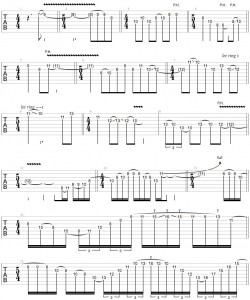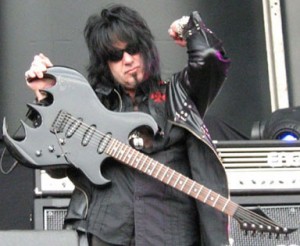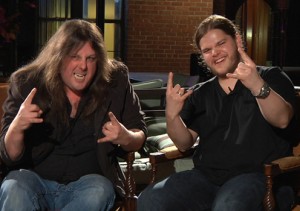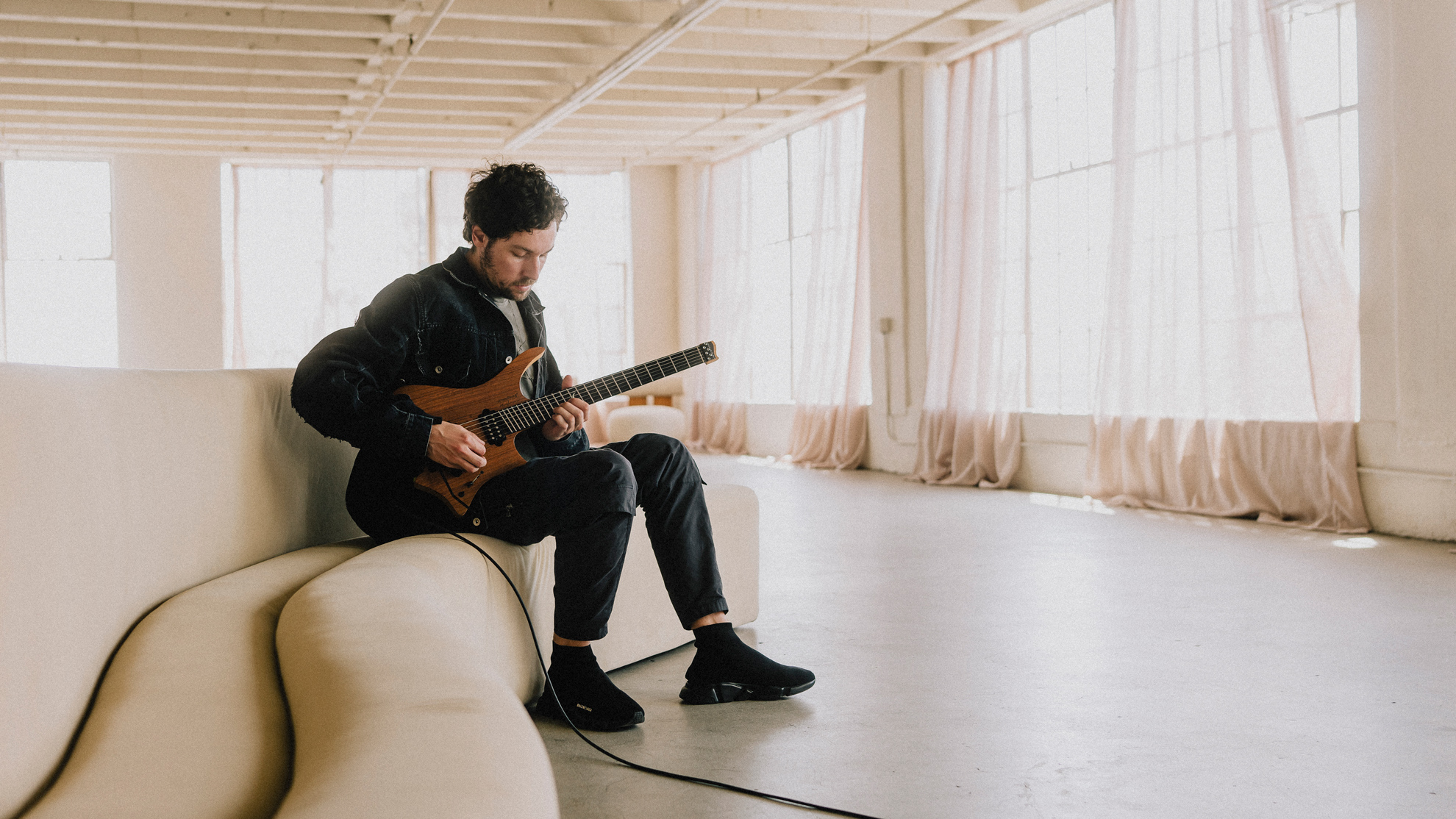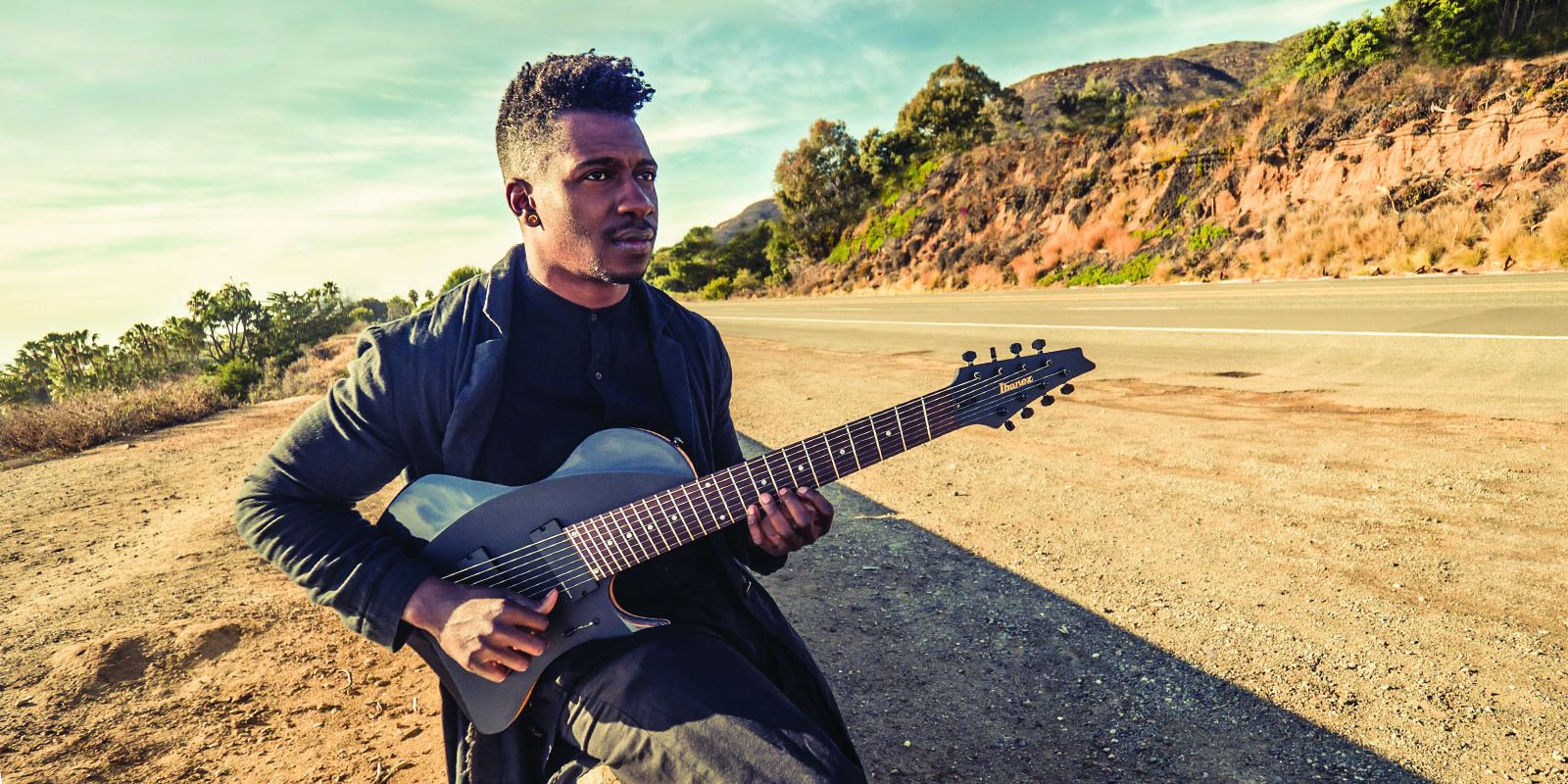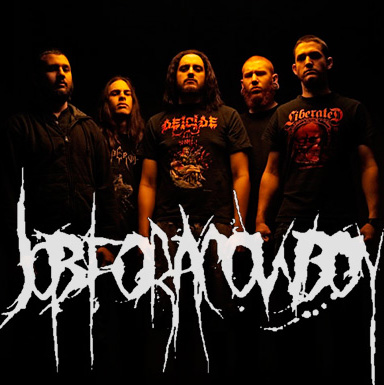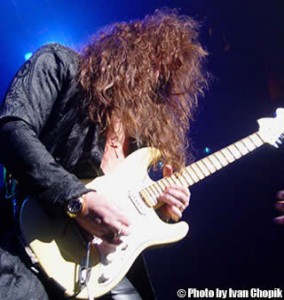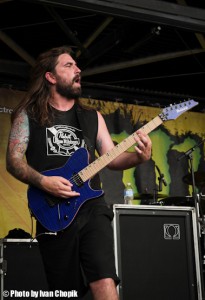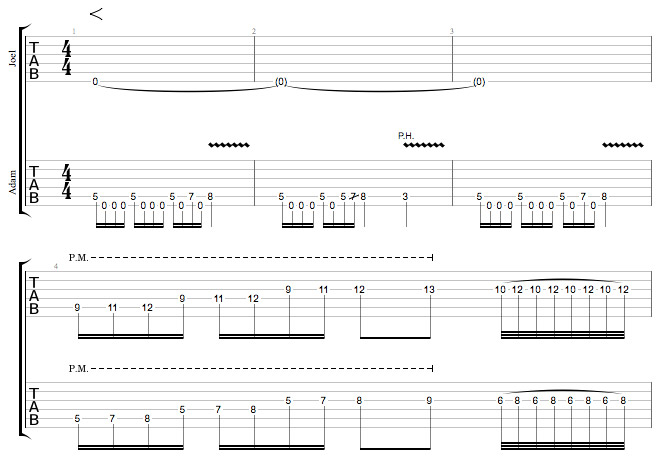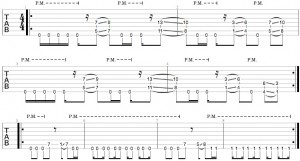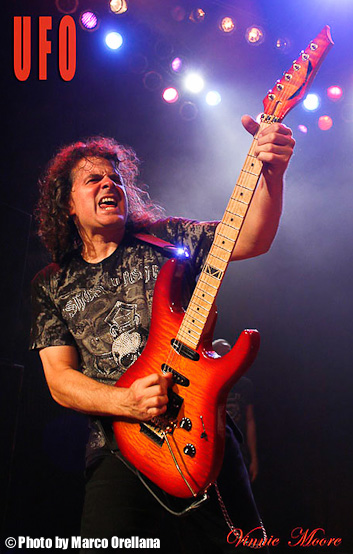 Though his first big break came in the form of a Pepsi commercial, Vinnie Moore’s guitar playing is anything but saccharine. He’s able to adapt his phrases to spice any auditory feast, dropping whole jaws rather than rotting teeth with ear candy. Moore began gigging at a very early age and by his twenties he was signed with Shrapnel Records as a solo artist, placing him in the pantheon of eighties shred meisters, such as Yngwie Malmsteen and Tony MacAlpine.
Though his first big break came in the form of a Pepsi commercial, Vinnie Moore’s guitar playing is anything but saccharine. He’s able to adapt his phrases to spice any auditory feast, dropping whole jaws rather than rotting teeth with ear candy. Moore began gigging at a very early age and by his twenties he was signed with Shrapnel Records as a solo artist, placing him in the pantheon of eighties shred meisters, such as Yngwie Malmsteen and Tony MacAlpine.
Moore went on to record several songs for Alice Cooper’s Hey Stoopid album before lending his hand to Mr. Cooper’s following tour. In 2004, he realized his childhood dream of joining the ranks of UFO to fill in the shoes of Michael Schenker. While recording and touring with the British rock legends, Moore has maintained a healthy solo career, most recently with his 2009 release To The Core. Taking a few precious minutes before shaking B.B. Kings’ in Times Square with UFO, Vinnie sat down with me to talk about the duties as UFO’s young gun and what’s in store for his future as a solo artist:
LD: You’ve been playing out with UFO for much of the past year in support of the Best Of A Decade release. Have you been focusing the set list more towards the past 10 years since you joined?
VM: No, we’re doing a lot of the old set. We need stuff from Strangers in the Night, Obsession, Light’s Out, because you gotta play that stuff. That’s what the fans want to hear. To me that’s that amongst the most fun stuff to play because I grew up listening to a lot of those old tunes, so it’s a lot of fun for me.
LD: Does the dynamic shift when you turn towards newer material in the set?
VM: It kind of flows pretty naturally, I think. I write a lot of the new stuff for the band and when I write for UFO it’s more in a straight ahead rock style with what their doing musically, as opposed to my solo stuff which could be all over the place musically.
I only give Phil [Mogg, UFO’s singer] the stuff that I think is right for the band so I think it all flows together pretty naturally. I immediately know whether something is right for UFO or not, like if something is too fusiony. I just submit a bunch of songs to Phil and he just chooses what he likes the best. I throw everything out there, but I throw my more rock stuff to the band and not the more experimental side of things.
LD: You came on after Michael Schenker left for the second time.
VM: I think there might have been somebody in between, but I can’t keep track. I think they told me at one point that I was the ninth guitarist in UFO. I mean there was the original guy and I think Schenker was second or third, Paul Chapman, somebody named Atomic Tommy, countless others that I’d never even heard of.
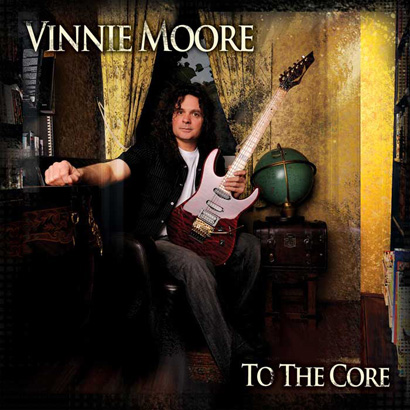
LD: When you first joined the band, did you feel obligated to curb your personal style to imitate a lot of Schenker’s playing or was it a more organic process?
VM: Actually, the first thing when I joined the band was that we were going to do a new record, so I was pretty much immediately called upon to be a writer and contributor for the record, which turned out to be You Are Here.
I wrote a bunch of songs for that and we did that before we played any live shows. So when we started touring we did two shows in Greece and played stuff from the You Are Here record and a bunch of the old classic material.
I pretty much approached the UFO tunes like I do my own solo stuff. Some of the parts of the song are very important and they just have to be played. They’re just simply part of the song. And there are other things where you can improvise because it’s more open and no matter who was playing guitar in the band would be improvising.
LD: What’s your favorite classic riff to play?
VM: I like playing “This Kid’s” a lot, “Light’s Out,” and “Rock Bottom.”
LD: Do you feel like your identity as a guitar player has shifted since you joined the band?
VM: I don’t know. It’s kind of hard to say. I think my identity shifted even before I joined the band. I was known early on with my first couple records for being the neo-classical shred guy, and then I came out with a couple more rock-oriented records like Meltdown and Out of Nowhere and then all of a sudden I was viewed differently because I was playing a different style.
I think, stylistically, I tend to be all over the place and shift back and forth. I just do that because I want to stay interested in music and if I’d do the same thing over and over again, then I would get bored. So I guess people look at what I do in UFO differently than what I do as a solo artist, but it’s still part of what I do, it’s just more the rock side of what I do. It’s just me and a band. I don’t try and take over any band or any project I play with and impose something different. I try and fit in and work as a team and still do my own thing within the context of the band.
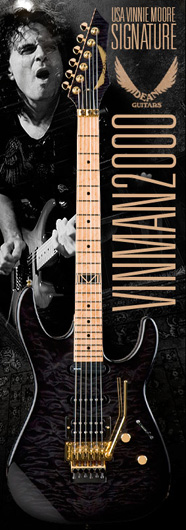
LD: Like with Alice Cooper?
VM: Yeah, that was a lot of fun. That was way back ’91. I did the Hey Stoopid record with him, played a couple songs on that, and then did the whole tour. It was a blast.
LD: Were you writing for him as well?
VM: I wasn’t. Initially they asked me to play two songs on the record and so I did that – rhythm tracks and solos. I think they were called “Dirty Dreams” and “Hurricane Years.” It went really well, and then they were going out on tour, needed a guitar player, and they asked me to join so I said “Okay! I’ll do it!”
LD: Let’s go back to the Shrapnel Days. Amongst that whole stable of artists, you were known for having a really clean picking technique. Can you talk about how you developed that in your shedding days?
VM: I used to do a LOT of right hand picking exercises and it really focused and concentrated me. I grew up and I heard Al DiMeola and he was just a master of picking fast with the staccato and the harmonic minor and I just thought “Wow! That’s amazing! I’ll never be able to do that.” I figured if I could just come close it would be really cool. So I really started to get into that style.
I started doing this workout routine with my right arm. It lasted 60 minutes a day. It was just over and over “upstroke-downstroke,” alternate picking back and forth. I just got way better to the point where the 60 minute workout started to take almost 35. I was getting quicker at it and I could see progress. It helped to not only get my right hand better but to get my left and right hand more in sync with one another.
LD: What was the revelatory Al DiMeola album that first pointed you towards that style and drove you to practice that hard?
VM: Casino. Elegant Gypsy was great, but Casino was my favorite.
LD: There was a while where you were picking from the elbow, and watching your live performances now, you have shifted towards picking from the wrist.
VM: You know, someone said that to me at a clinic once and I really wasn’t aware of that. I guess it’s kind of a gradual process that has happened over the years without me consciously being aware of it. It just sort of happened.
Yeah I used to pick totally from the elbow, but I’m actually not picking as much as I did in the old days. I’m doing a little of the fast picking, but I’m mixing it up a lot more, doing the hybrid picking, more bluesy and legato. Sometimes I use the arm and sometimes I use the wrist and I don’t know why. It just sort of happens.
LD: You’ve had your own signature guitar with Dean since 2008. Is that still your main axe?
VM: Yep, it’s called the Vin Man 2000. We released an American model which is made in the Dean custom shop in Florida. Really nice guitar. Now we’re just getting ready to release an import model which is going to be a quarter of the price. It’s going to be made overseas, but I’ve tried the prototypes and they’re pretty spot on. They play very well. The only big difference will be the pickups, but the guitar, playing-wise with sound and the wood is really happening.
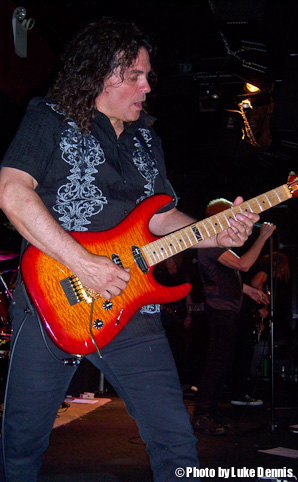
LD: What amps are you playing for the tour?
VM: I’m using Marshalls on the road right now – the Marshall JCM 2000. At home in the studio I have the Marshall, I have a Mesa Boogie, a Carvin, a Peavey Classic. I have my old Marshall that I use with a Tube Screamer. I just kind of mix it up at home.
LD: The last album from UFO, The Visitor, was released in 2009 – the same year you dropped your solo album To The Core. Is there anything new you have coming down the pike?
VM: We’re working on the new UFO record, and hopefully that’s going to be coming out in the next couple months. We’re in the process of writing and getting it all together. As far as solo, I have a bunch of instrumental songs laying around.
I also have vocal songs, and I would like to do a record with a singer or maybe a few singers. I don’t know. I haven’t figured it out yet, but I want to do a solo vocal thing. It would be much different than what UFO is doing.
LD: If you could have anybody sing on it, who would you get?
VM: Chris Cornell would be great. That’s just one of the guys that comes to the top of my head.
LD: Have you been playing any of the new UFO material on this tour?
VM: No, we’re just in the stage where we’ve demoed and we haven’t really heard what Phil’s going to do with it yet vocally. He doesn’t let anybody know what he’s up to until the last second.
LD: Your career started when you first got discovered on a Pepsi commercial back in the eighties, and the music industry has changed a lot since then. How do you think the cult of the guitar hero has changed with it?
VM: Wow, it’s just so unpredictable these days. I wouldn’t really want to be a new artist starting out in this climate. It’s so weird. A lot of it’s the Internet and the illegal downloads, but at the same time it’s a great tool because it enables me to record records at home on a computer. It’s a double-edged sword, I guess. I just do what I do because I love it and I’ve been lucky enough over the years to continue doing what I love, and I’m thankful for that.
LD: Around the turn of the millennium, guitar virtuosity took a back seat to the garage rock revival. Do you think it has made a resurgence since?
| http://www.youtube.com/v/hFexOxFKqaI |
VM: Well, I don’t know if it’s coming back. There just seems to be a hardcore cult following type of thing. It’s not huge, but I think there are people that are really into that and they’ve always been there and they’re still there.
LD: What advice would you have for young guitar players?
VM: First I would say you have to love what you’re doing. Be passionate about it and everything else falls into place. Find a teacher and study and learn and just go with it. Love what you’re doing and that carries you.
LD: What was the best technical piece of advice a teacher has ever given you?
VM: Man, that’s a tough one… Learn as much as you can and then just forget it all and let if flow.
LD: Do you feel that theory and scales are still a conscious part of your playing and improvising?
VM: I don’t really think about what I’m doing harmonically or with scales or chords. I learned all that stuff and I kind of just feel it. When I write and play, I just go for it. I go for what I feel or anything that pops into my head.
I’m not thinking about theory or superimposing certain notes over a chord as much as I’m hearing it naturally. More feel, less thinking. But you have to learn it first of all to have it sink in.
LD: Having toured all over the world, what are your favorite audiences to play for?
VM: Really, the fans have been great everywhere, and that’s being totally honest. I had never been to Russia, and when we played there and I just remember looking into the crowd and I could have been anywhere in America. It just seemed like great fans. And it’s the same everywhere.




